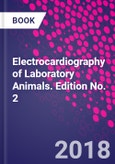Electrocardiography of Laboratory Animals, Second Edition, is the only publication covering electrocardiography of laboratory animals. With countries instituting requirements for the care of laboratory animals in research, this publication offers a standard on performing and analyzing ECGs. Topics covered include safety electrocardiography, toxicology, safety pharmacology, and telemetry, all important areas of discussion for biological and medical researchers, veterinarians, zoologists, and students who need to understand the electrocardiography of five species of animals used in research: canines, nonhuman primates, mini pigs, rodents (rats and mice), rabbits and cats.
Please Note: This is an On Demand product, delivery may take up to 11 working days after payment has been received.
Table of Contents
1. Electrocardiography in preclinical safety 2. Fundamental principles of electrocardiography 3. Electrocardiography of rodents 4. Electrocardiography of rabbits 5. Electrocardiography of cats 6. Electrocardiography of dogs 7. Handling and restraint of non-human primates 8. Electrocardiography of non-human primates 9. Electrocardiography of neonates/juveniles 10. Electrocardiography of minipigs 11. Telemetry in preclinical safety studies 12. PR (PQ), QRS, QT and other issues








